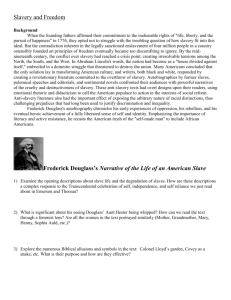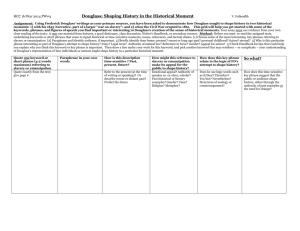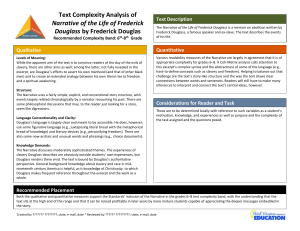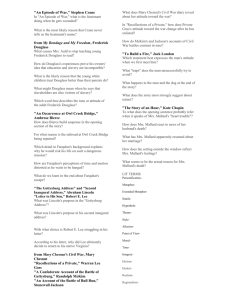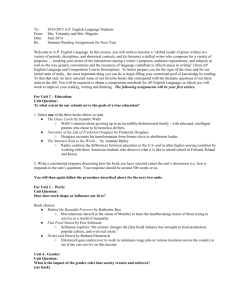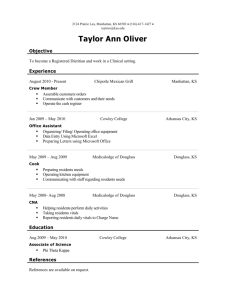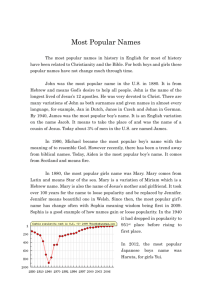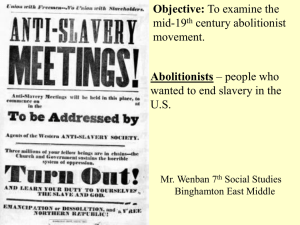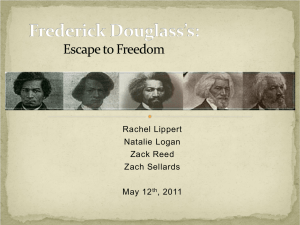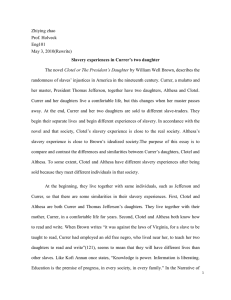research paper
advertisement
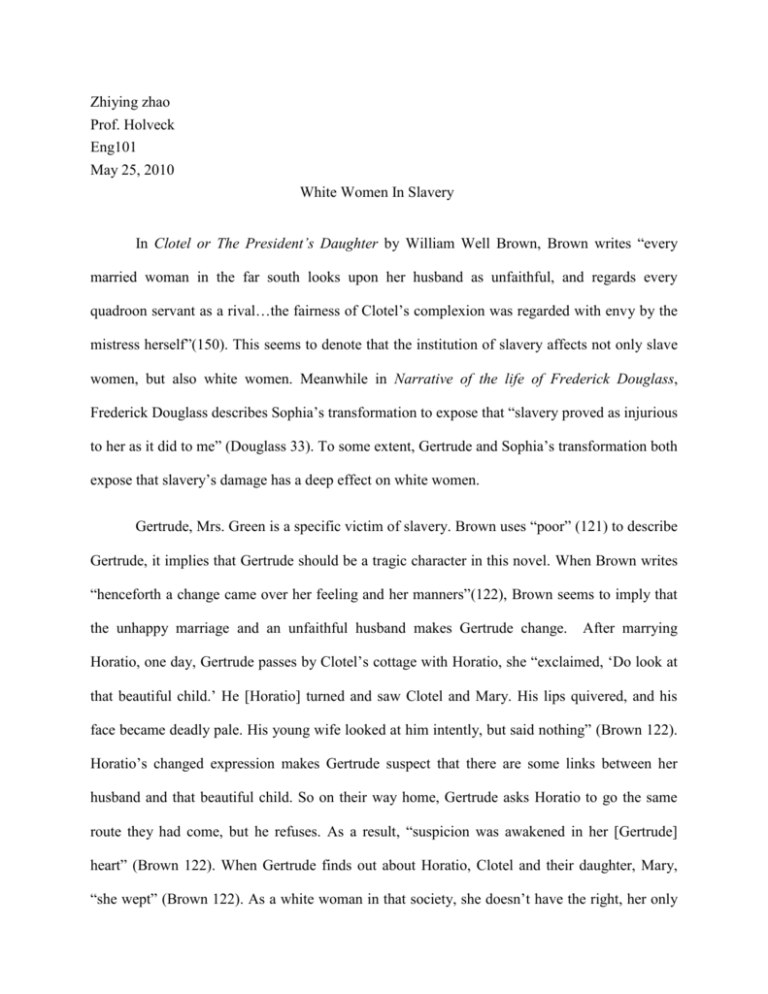
Zhiying zhao Prof. Holveck Eng101 May 25, 2010 White Women In Slavery In Clotel or The President’s Daughter by William Well Brown, Brown writes “every married woman in the far south looks upon her husband as unfaithful, and regards every quadroon servant as a rival…the fairness of Clotel’s complexion was regarded with envy by the mistress herself”(150). This seems to denote that the institution of slavery affects not only slave women, but also white women. Meanwhile in Narrative of the life of Frederick Douglass, Frederick Douglass describes Sophia’s transformation to expose that “slavery proved as injurious to her as it did to me” (Douglass 33). To some extent, Gertrude and Sophia’s transformation both expose that slavery’s damage has a deep effect on white women. Gertrude, Mrs. Green is a specific victim of slavery. Brown uses “poor” (121) to describe Gertrude, it implies that Gertrude should be a tragic character in this novel. When Brown writes “henceforth a change came over her feeling and her manners”(122), Brown seems to imply that the unhappy marriage and an unfaithful husband makes Gertrude change. After marrying Horatio, one day, Gertrude passes by Clotel’s cottage with Horatio, she “exclaimed, ‘Do look at that beautiful child.’ He [Horatio] turned and saw Clotel and Mary. His lips quivered, and his face became deadly pale. His young wife looked at him intently, but said nothing” (Brown 122). Horatio’s changed expression makes Gertrude suspect that there are some links between her husband and that beautiful child. So on their way home, Gertrude asks Horatio to go the same route they had come, but he refuses. As a result, “suspicion was awakened in her [Gertrude] heart” (Brown 122). When Gertrude finds out about Horatio, Clotel and their daughter, Mary, “she wept” (Brown 122). As a white woman in that society, she doesn’t have the right, her only business is her husband and family and her mission is to manage her family. However, when Gertrude finds that “Clotel, a name which she [Gertrude] had often heard Horatio murmur in uneasy slumbers…she never had loved” (Brown 122), she seems feel worthless in her business. Therefore, she insists that Clotel should be sold because she doesn’t want Clotel and Horatio to live under the same roof and make her life worse and Mary is brought into Horatio’s dwelling as a servant. In order to make Horatio feel guilty, Mrs. Green punishes Horatio’s daughter, Mary by making her work outside without protection. When Brown writes “his wife felt that she had been deceived, and determined to punish her deceiver…the child was white, what should be done to make her look like other negroes, was the question Mrs. Green asked herself…the white slavegirl was put to work, without either bonnet or handkerchief upon her head” (Brown 156), this seems to show that making Mary work outside without protection is one of Mrs. Green’s plans. Clotel is supposed to be her deceiver, but Clotel has been sold and then Mary as Clotel’s daughter becomes her target. Mary is an octoroon and looks close to a white. Mrs. Green tries to make Mary look like other negroes because she wishes that Horatio’s daughter will never live life as a white person; After looking like other negroes, even though Mary escapes from Green’s house, Mary will be considered as a slave and brought back to her owner. In addition, Brown writes that “the close resemblance between the father and child annoyed the mistress more than the mere whiteness of the child’s complexion”(156), it shows that Mary’s white complexion and resemblance to Horatio make Mrs. Green feel uncomfortable and remind her she doesn’t do well with her business. She doesn’t want to share her husband with Clotel, although she knows she is Horatio’s legal wife and Clotel has been sold. She wants her husband to feel infidelity, so she punishes his daughter. However, punishing Mary makes Mrs. Green feel guilty instead of Horatio .as author writes, “after finding that Horatio Green had lost all feeling for his child, Mrs. Green’s own heart became touched for the offspring of her husband, and she became its friend”(210); Brown uses the word “touched” to describe Mrs. Green’s heart which seems to imply Mrs. Green isn’t really a vicious woman. She punishes Mary in order to make Horatio feel guilt that Horatio had deceived her. However, when she finds out that punishing Mary doesn’t have an effect on Horatio, she tries to be Mary’s friend. When Brown writes “its friend”(210), Brown seems to imply that even though Mrs. Green becomes Mary’s friend, they still can’t become really equal friends. In that society, Women were expected to remain subservient to their fathers and husbands. Women don’t have rights to decide who should be their friend and who they want to be friends. A similar scene happens in Frederick Douglass’ novel, Narrative of the life of Frederick Douglass. Douglass uses Sophia’s transformation from kind to cruel as an example to express the negative effects of slavery on white women. At the beginning, Sophia is a kind white woman. When Douglass introduces her, he writes “My new mistress proved to be all she appeared when I first met her at the door,-a woman of the kindest heart and finest feeling…I was utterly astonished at her goodness…she was entirely unlike any other white woman I had ever seen” (31). Douglass seems to imply that he is happy to have a very kind mistress. In addition, Sophia gives the opportunity for Douglass to learn how to read and write. Sophia, who owns no slaves at beginning of her life, thinks every person should be treated as a human so that she is on her best behavior when she stays with slaves. Meanwhile, it seems to me that Douglass looks for every word that he knows to give praise to his mistress in order to expose that the institution of slavery change a so kind white woman. Her husband, Mr. Auld’s words make Sophia begin to change. When Douglass writes “But, alas” (31), it seems to imply that things will be changed in his life. When Mr. Auld, Sophia’s husband finds out that Sophia has taught Douglass how to read and write, he forbids his wife’s behavior and says that “it was unlawful, as well as unsafe, to teach a slave to read…a nigger should know nothing but to obey his master…learning would spoil the best nigger in the world” (Douglass 31) .The message that owner shouldn’t teach and spoil slaves is sent to Sophia. In that society, men were the primary "breadwinners" and women were expected to stay at home to raise children, to manage their families. In Sophia’s opinion, she believes that every word what her husband say is right, so that she feels that her behavior is wrong and makes her family unsafe. She believes that her task and duty is to treat slaves as unhuman. In order to do the right thing and protect her family, she does her best to practice unhuman behavior. Sophia’s transformation is the product of slavery. When Douglass writes “She [Sophia] finally became even more violent in her opposition than her husband himself …she seemed anxious to do better” (34), it seems to show that Sophia has already become an evil owner because she believes her task is to “be evil”. Douglass uses a living and breathing example to show how slavery changes a kind white woman. According to the text “it was at least necessary for her to have some training in the exercise of irresponsible power” (Douglass 33), Douglass seems to imply that no one is born to be an evil slave owner. They are trained to be that way. Sophia, who Douglass looks for every word that he knows to give praise to, was trained to be an emotionless slaveholder. Taking all mentioned above into account, Gertrude and Sophia’s transformation both expose that slavery’s damage has a deep effect on white women. To some extent, white women could not vote, could not sue or be sued, could not testify in court, had extremely limited control over personal property as slaves. The natural right is belonged to white men. The only right for white women is they can marry white men. In that society, as white women, their only businesses were their families. They did their best to manage and protect their family, so that white women always put their husband and family in firstly. However, at the same time they were affected by slavery. Work Cite Brown, William Wells. Clotel or the President’s Daughter. Ed. Robert Levine. New York: Bedford-St. Martin’s,2000. 81-227. Print. Douglass, Frederick. Narrative of the life of Frederick Douglass. Ed. John W. Blassingame, John R. McKivigan, and Peter P. Hinks. New Haven & London: Yale University. 2001. 3-87. Print.
